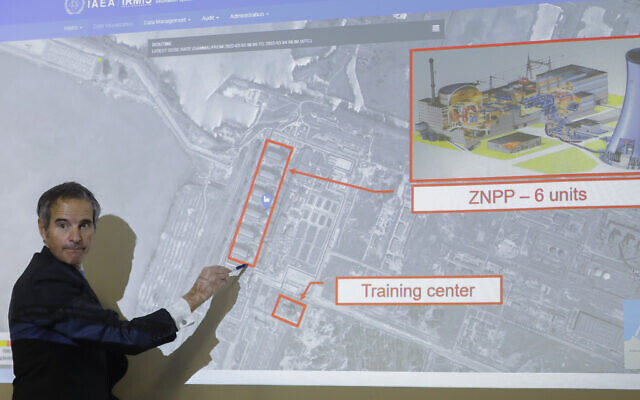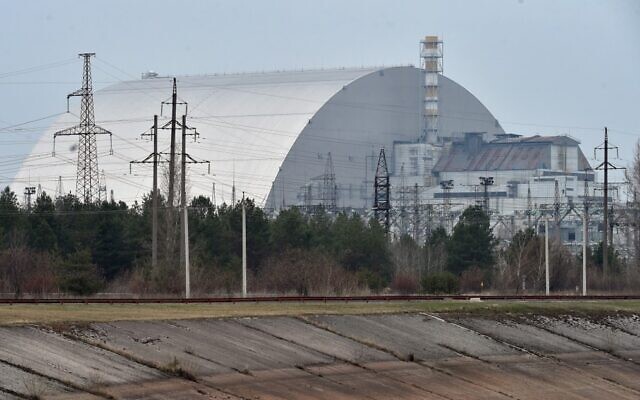UNITED NATIONS — Russia’s “reckless” overnight attack on a nuclear power plant in Ukraine is a dangerous escalation that “represents a dire threat to all of Europe and the world,” the US ambassador to the United Nations said on Friday.
“By the grace of God, the world narrowly averted a nuclear catastrophe last night,” Linda Thomas-Greenfield told the Security Council.
“Russia’s attack last night put Europe’s largest nuclear power plant at grave risk,” Thomas-Greenfield said.
“It was incredibly reckless and dangerous. And it threatened the safety of civilians across Russia, Ukraine, and Europe,” she said.
“Nuclear facilities cannot become part of this conflict,” Thomas-Greenfield said.
She urged Russian leader Vladimir Putin to end the invasion of Ukraine.
“Not only has he not listened, we’ve just witnessed a dangerous new escalation that represents a dire threat to all of Europe and the world,” Thomas-Greenfield said.
“President Putin must stop this humanitarian catastrophe by ending this war and ceasing these unconscionable attacks against the people of Ukraine,” she said. “Mr. Putin must stop this madness, and stop it now.”
This image made from a video released by Zaporizhzhia nuclear power plant shows a bright flaring object landing on grounds of the nuclear plant in Enerhodar, Ukraine, on March 4, 2022. (Zaporizhzhia nuclear power plant via AP)
Moscow’s ambassador to the UN denied accusations that Russian forces had shelled Europe’s largest atomic power plant in Zaporizhzhia.
“These statements are simply untrue,” Vassily Nebenzia told the Security Council. “This is all part of an unprecedented campaign of lies and disinformation against Russia.”
He said Russian troops had exchanged small arms fire with Ukrainian forces at Zaporizhzhia, but had not shelled the facility in southern Ukraine.
He said the fighting occurred at a training complex “located just outside the territory of the nuclear power plant” and accused “Ukrainian saboteurs” of setting fire to the training facility.
“The operation of the nuclear power plant continues normally,” Nebenzia said. “Nothing threatens the safety of the six power units.
“There is no threat of a release of radioactive material.”
Ukraine requests a no-fly zone
Sergiy Kyslytsya, the Ukrainian envoy to the UN, lashed out at his Russian counterpart, accusing him of spreading “lies.”
He said Russian troops in control of the nuclear facility were refusing access to Ukrainian inspectors.
Kyslytsya also formally called for the UN to establish a no-fly zone over Ukraine.
“Establishing a ban on all flights in the airspace of Ukraine should be a top priority for the Security Council,” he said.
NATO has already ruled out setting up a no-fly zone over Ukraine and Russia would veto any such proposal in the Security Council.

IAEA Director-General Rafael Mariano Grossi speaks at a press conference about the situation at the Zaporizhzhia Nuclear Power Plant in Ukraine in Vienna, Austria, on Friday, March 4, 2022. (AP Photo/Lisa Leutner)
Zhang Jun, the Chinese envoy to the UN, called on the international community meanwhile to “stay cool-headed and rational.”
“Any action must contribute to de-escalation and diplomatic settlement, rather than adding fuel to the fire, leading to further escalation and deterioration of the situation,” the Chinese ambassador said.
Rosemary DiCarlo, UN undersecretary-general for political affairs, told the council that attacks on nuclear power facilities “are contrary to international humanitarian law.”
Rafael Grossi, director-general of the International Atomic Energy Agency (IAEA), speaking to the council from an airplane on a flight to Iran, said he was prepared to travel to Ukraine to ensure the security of the country’s nuclear facilities.
“This mission will be strictly restricted and circumscribed to the safety and security of the nuclear installations in Ukraine,” Grossi said.
He told the Security Council that a “projectile” hit a building adjacent to a block of six reactors at the Zaporizhzhia plant, sparking a fire that didn’t affect its operation, although he stressed there is nothing normal when military forces are in charge of the site.
Grossi said the IAEA was informed by Russia a few days ago that its military forces were moving to take control of the C plant in the southeastern city of Enerhodar, similar to troops’ seizure last week of Chernobyl, the site of the world’s worst nuclear disaster.
He added that the advance of Russian troops toward the perimeter of the nuclear power plant “was met with opposition and some group of civilians attacking the access to the plant.” In the early hours Friday, he said, the IAEA “got information that a projectile had impact [sic] a building adjacent to the block of reactors, six of them.” He did not say who fired the projectile.

A file picture taken on April 13, 2021, shows the giant protective dome built over the sarcophagus covering the destroyed fourth reactor of the Chernobyl Nuclear Power Plant (Sergei Supinsky/AFP)
On Thursday, Grossi said Ukraine informed the IAEA that staff who have been kept at the Chernobyl Nuclear Power Plant since Russian troops took control of the site a week ago are facing “psychological pressure and moral exhaustion.”
He said the staff must be allowed to rest and rotate so their crucial work can be carried out safely and securely.
Grossi received “a joint appeal from the Ukraine Government, regulatory authority and the national operator which added that personnel at the Chernobyl site ‘have limited opportunities to communicate, move and carry out full-fledged maintenance and repair work,’” the IAEA said in a statement.
Reactor No. 4 at the power plant exploded and caught fire in 1986, shattering the building and spewing radioactive material high into the sky. Even 36 years later, radioactivity is still leaking from history’s worst nuclear disaster.
Ukraine has lost regulatory control over all the facilities in the Chernobyl Exclusion Zone to the Russians and asked the IAEA to undertake measures “in order to reestablish legal regulation of safety of nuclear facilities and installations” within the site, the statement added.
Grossi has repeatedly stressed that any military or other action that could threaten the safety or security of Ukraine’s nuclear power plants must be avoided.
“I remain gravely concerned about the deteriorating situation in Ukraine, especially about the country’s nuclear power plants, which must be able to continue operating without any safety or security threats,” he said. “Any accident caused as a result of the military conflict could have extremely serious consequences for people and the environment, in Ukraine and beyond.”